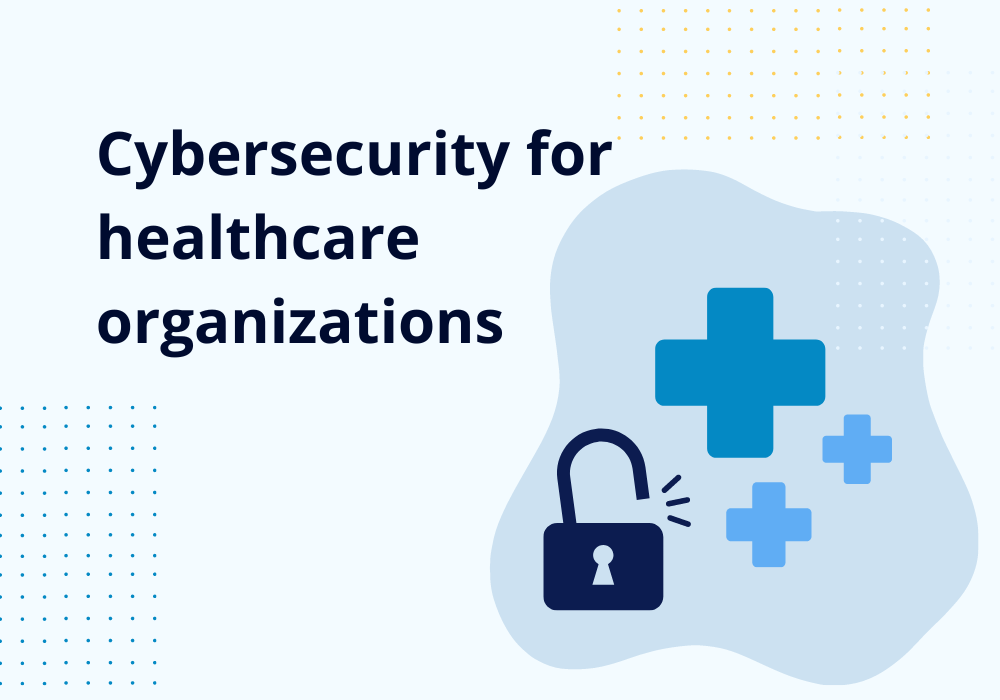Why the healthcare industry needs to think about cyber health too
May 26, 2022 •

The healthcare industry is at the top of the list in terms of high-risk industries for cyber attacks. There are a few reasons as to why this would be, and yes it’s exactly what you’re thinking of.
Healthcare data holds information that is valuable to cyber criminals and with the industry moving towards more online charts and electronic filing data, it’s becoming a prime target for attacks. A patient’s private information has proved to be very valuable for cyber attackers and because of this, the healthcare industry is vulnerable.
Cybersecurity Issues in the Healthcare Industry
One common cybersecurity issue in the healthcare industry is misdelivery. Misdelivery happens when either:
- An email is sent out to the incorrect email address or distribution list which allows unauthorized individuals to gain access to that information; or
- Snail mail in the sense that address labels that are created for a large number of contacts go out of sync and ultimately get sent to the wrong address which again allows for unauthorized access.
Another issue is affordability. Community hospitals, small healthcare institutions, and independent doctors often do not have the resources to front the costs of cyber security protection like the bigger hospitals and clinics do. They may be unable or unwilling to protect their cyber infrastructure, retrieve lost data, or even pay a ransom should they be a victim, and therefore have no choice but to close their businesses.
Most cybercriminal groups that target the healthcare industry are financially motivated, hence why the most common attack is through ransomware. The goal for these cyber criminals is to obtain the confidential records and use it to sell on the dark web for top dollar. External data breaches are the most common however there have been reports of internal breaches as well. A common issue that can create vulnerability is human error and mainly privilege misuse. Privilege misuse happens when the establishment doesn’t have proper monitoring in place and allows users more access to databases than needed. This results in data error that leads to data loss and unauthorized access to confidential information.
What makes cybersecurity in healthcare challenging
What exactly makes cybersecurity so challenging in the healthcare industry? As we mentioned before, affordability is a huge factor in healthcare in whether or not a hospital or clinic is protected. But there is a more prevalent issue that is causing cybersecurity to be such a challenge.
Each day, there are more medical devices being deployed in hospitals and these devices make up 74% of the devices connected to the hospital’s network. These connected devices are what keep patients alive and quite literally can make the difference between the life or death of a patient. While yes these connected devices can make physicians work more efficiently and provide more affordable care, the devices are still subject to vulnerability as those devices now act as an entry point to the hospitals network.
The main challenges in cybersecurity for the healthcare industry are:
- Budget constraints.
- Patient information being available on the darknet.
- Medical devices lacking security control.
- Medical professionals needed to access information remotely (especially during COVID-19 pandemic).
- Lack of cyber risk training for employees.
- Outdated technology.
Cybersecurity and HIPAA
In order to remain compliant with HIPAA regulations, a healthcare provider must safeguard its clients personal and confidential information. An important part of HIPAA is the law that a patient’s information cannot be shared without the patient’s consent or knowledge.
While HIPAA compliance is still important, it seems that it’s not enough in keeping records safe. Any violation of HIPAA policies comes with a severe penalty and for some health care practitioners, most of their budget is spent meeting these policies which then causes them to neglect any further cybersecurity measures. HIPAA compliance does not necessarily equal cyber security.
Solutions for the healthcare industry
So what can the healthcare industry do to protect themselves? Well, as cybersecurity becomes more of a household topic and is becoming more regulated, healthcare providers have many inexpensive MFA options to choose from as opposed to a few years ago.
Without cybersecurity prevention measures in place, you are risking not only your business, but also your patients’ private information. Leaving any sort of vulnerability in your business is not ideal and can end up being more costly than if you were to implement an MFA solution.
To learn more about cybersecurity threats to the healthcare industry and how you can protect yourself, book a call with our team today.